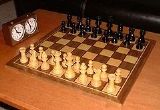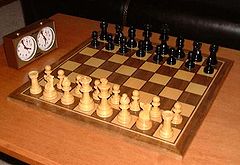
Strategy game
Encyclopedia

Game
A game is structured playing, usually undertaken for enjoyment and sometimes used as an educational tool. Games are distinct from work, which is usually carried out for remuneration, and from art, which is more often an expression of aesthetic or ideological elements...
(e.g. computer, video or board game
Board game
A board game is a game which involves counters or pieces being moved on a pre-marked surface or "board", according to a set of rules. Games may be based on pure strategy, chance or a mixture of the two, and usually have a goal which a player aims to achieve...
) in which the players' uncoerced
Coercion
Coercion is the practice of forcing another party to behave in an involuntary manner by use of threats or intimidation or some other form of pressure or force. In law, coercion is codified as the duress crime. Such actions are used as leverage, to force the victim to act in the desired way...
, and often autonomous decision-making skills have a high significance in determining the outcome. Almost all strategy games require internal decision tree
Decision tree
A decision tree is a decision support tool that uses a tree-like graph or model of decisions and their possible consequences, including chance event outcomes, resource costs, and utility. It is one way to display an algorithm. Decision trees are commonly used in operations research, specifically...
style thinking, and typically very high situational awareness.
The term "Strategy
Strategy
Strategy, a word of military origin, refers to a plan of action designed to achieve a particular goal. In military usage strategy is distinct from tactics, which are concerned with the conduct of an engagement, while strategy is concerned with how different engagements are linked...
" comes ultimately from Greek, "Strategia," meaning Generalship. It differs from "Tactics" in that it refers to the general scheme of things whereas "Tactics" refers to organization and execution.
Abstract strategy
In abstract strategy gameAbstract strategy game
An abstract strategy game is a strategy game, aiming to minimise luck, and without a theme. Almost all abstract strategy games will conform to the strictest definition of: a board or card game, in which there is no hidden information, no non-deterministic elements , in which two players or teams...
s, the game is only loosely tied to a real-world theme, if at all.
The mechanics do not attempt to simulate reality, but rather serve the internal logic of the game.
A purist's definition of an abstract strategy game requires that it cannot have random elements or hidden information. This definition includes such games as Chess
Chess
Chess is a two-player board game played on a chessboard, a square-checkered board with 64 squares arranged in an eight-by-eight grid. It is one of the world's most popular games, played by millions of people worldwide at home, in clubs, online, by correspondence, and in tournaments.Each player...
, Go and Arimaa
Arimaa
The objective of the game is to move a rabbit of one's own color onto the home rank of the opponent. Thus Gold wins by moving a gold rabbit to the eighth rank, and Silver wins by moving a silver rabbit to the first rank...
(a game with multiple moves within a turn). However, many games are commonly classed as abstract strategy games which do not meet these criteria. Games such as Backgammon
Backgammon
Backgammon is one of the oldest board games for two players. The playing pieces are moved according to the roll of dice, and players win by removing all of their pieces from the board. There are many variants of backgammon, most of which share common traits...
, Octiles, Can't Stop, Sequence
Sequence (board game)
Sequence, a board-and-card game, was invented by Douglas Reuter in Minneapolis, Minnesota over the two year period in the 1970's. In June, 1981, Mr. Reuter entered into a license agreement with Jax Ltd., Inc. which authorizes it to manufacture and distribute Sequence and was first sold in a retail...
and Mentalis have all been described as "abstract strategy", despite having a luck element. A smaller category of non-perfect abstract strategy games incorporate hidden information without using any random elements. An example is Stratego
Stratego
Stratego is a board game featuring a 10×10 square board and two players with 40 pieces each. Pieces represent individual officers and soldiers in an army. The objective of the game is to either find and capture the opponent's Flag or to capture so many of the opponent's pieces that he/she cannot...
.
Team strategy
One of the most focused team strategy games is 'Contract BridgeContract bridge
Contract bridge, usually known simply as bridge, is a trick-taking card game using a standard deck of 52 playing cards played by four players in two competing partnerships with partners sitting opposite each other around a small table...
'. This card game consists of two teams of two players, whose offensive and defensive skills are continually in flux as the game's dynamic progresses. Some argue that the benefits of playing this team strategy card game extend to those skills and strategies used in business and that the playing of these games help to automate strategic awareness.
Simulation
This type of game is an attempt to simulate the decisions and processes inherent to some real-world situation. Most of the mechanics are chosen to reflect what the real-world consequences would be of each player action and decision.Abstract games cannot be completely divided from simulations and so games can be thought of as existing on a continuum of almost pure abstraction (like Abalone
Abalone (board game)
Abalone is an award winning two-player strategy board game designed by Michel Lalet and Laurent Levi in which each player is represented by marbles of opposing colors...
) to almost pure simulation (like Strat-o-Matic Baseball
Strat-o-Matic
Strat-O-Matic is a game company based in Glen Head, New York, that develops and publishes sports simulation games. It produces tabletop baseball, football, basketball, and ice hockey simulations, as well as personal computer adaptations of each, but it is primarily known for its baseball...
).
Wargame
WargameWargaming
A wargame is a strategy game that deals with military operations of various types, real or fictional. Wargaming is the hobby dedicated to the play of such games, which can also be called conflict simulations, or consims for short. When used professionally to study warfare, it is generally known as...
s are simulations of military battles, campaigns or entire wars. Players will have to consider situations that are analogous to the situations faced by leaders of historical battles. As such, war games are usually heavy on simulation elements, and while they are all "strategy games", they can also be "strategic" or "tactical" in the military jargon sense.
Traditionally, wargames have been played either with miniatures
Miniature wargaming
Miniature wargaming is a form of wargaming that incorporates miniature figures, miniature armor and modeled terrain as the main components of play...
, using physical models of detailed terrain and miniature representations of people and equipment to depict the game state; or on a board, which commonly uses cardboard counter
Counter (board wargames)
Boardgame counters are usually small cardboard squares moved around on the map of a wargame to represent armies, military units or individual military personnel. The first modern mass-market wargame, based on cardboard counters and hex-board maps, was Tactics, invented by Charles S. Roberts in 1952...
s on a hex map
Hex map
A hex map, hex board or hex grid is a gameboard design commonly used in wargames of all scales. The map is subdivided into small regular hexagons of identical size.-Advantages and disadvantages:...
.
Popular miniature wargames include Warhammer 40,000
Warhammer 40,000
Warhammer 40,000 is a tabletop miniature wargame produced by Games Workshop, set in a dystopian science fantasy universe. Warhammer 40,000 was created by Rick Priestley in 1987 as the futuristic companion to Warhammer Fantasy Battle, sharing many game mechanics...
or its fantasy counterpart Warhammer Fantasy
Warhammer Fantasy Battle
Warhammer: The Game of Fantasy Battles is a tabletop wargame created by Games Workshop. It is the origin of the Warhammer Fantasy setting....
. Popular strategic board wargames include Risk
Risk (game)
Risk is a strategic board game, produced by Parker Brothers . It was invented by French film director Albert Lamorisse and originally released in 1957 as La Conquête du Monde in France. Risk is a turn-based game for two to six players...
, Axis and Allies
Axis and Allies
Axis & Allies is a popular series of World War II strategy board games, with nearly two million copies printed. Originally designed by Larry Harris and published by Nova Game Designs in 1981, the game was republished by the Milton Bradley Company in 1984 as part of the Gamemaster Series of board...
, Diplomacy
Diplomacy (game)
Diplomacy is a strategic board game created by Allan B. Calhamer in 1954 and released commercially in 1959. Its main distinctions from most board wargames are its negotiation phases and the absence of dice or other game elements that produce random effects...
, and Paths of Glory
Paths of Glory (board game)
Paths of Glory: The First World War, 1914-1918 is a strategy board wargame, designed in 1999 by the six-time Charles S. Roberts Awards winner Ted Raicer and published by GMT Games. It covers World War I from its outbreak to the 1918 Armistice, or based on the progress of the game a hypothetical...
. Advanced Squad Leader
Advanced Squad Leader
Advanced Squad Leader is a tactical-level board wargame, originally marketed by Avalon Hill Games, that simulates actions of approximately company or battalion size in World War II. It is a detailed game system for two or more players . Components include the ASL Rulebook and various games called...
is a successful tactical scale wargame.
Strategy video games
Strategy video games are categorized based on whether they offer the continuous gameplay of real-time strategyReal-time strategy
Real-time strategy is a sub-genre of strategy video game which does not progress incrementally in turns. Brett Sperry is credited with coining the term to market Dune II....
(RTS), or the discrete phases of turn-based strategy
Turn-based strategy
A turn-based strategy game is a strategy game where players take turns when playing...
(TBS). Often the computer is expected to emulate a strategically thinking "side" similar to that of a human player (such as directing armies and constructing buildings), or emulate the "instinctive" actions of individual units that would be too tedious for a player to administer (such as for a peasant to run away when attacked, as opposed to standing still until otherwise ordered by the player); hence there is an emphasis on artificial intelligence.

